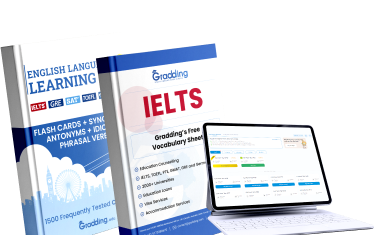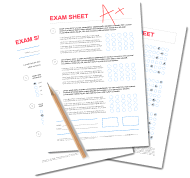IELTS vocabulary weighs 25% overall, be it writing or speaking, it plays a significant role in the exam. There are separate lists of lexical resources for each section. However, vocabulary for IELTS can not be confined to these lists. There are a lot of words in the English language, and learning all of them from one write-up isn't possible. Thus, memorising words for the exam might not improve your vocabulary for IELTS. Instead, try and learn more synonyms. Apart from that, a habit of reading extensively will help you improve your vocabulary.

Table of Contents
Do you want an eight-band score or higher in your IELTS exam? If yes, then it is vital to focus on IELTS vocabulary as it contributes to 25% of overall scores in writing and speaking tests. But before diving deep, it is crucial to understand the meaning of vocabulary for IELTS.
For all those who are confused, do not worry. This blog of Gradding.com will make everything clear. Vocabulary means knowing the meaning of words and precisely using them in every section, such as reading, writing, speaking, or listening. So, now that you know the basic definition of vocabulary for IELTS, it is time to explore its significance.
Wondering why vocabulary is an important element of the IELTS exam? If yes, read the points below to understand its significance.
The IELTS writing section tests your ability to express your thoughts precisely. The use of appropriate words can help you with the same. Therefore, knowledge of excellent IELTS English words is necessary to put forward your opinions in a presentable manner.
The reading section is about understanding the passage's context and identifying the key ideas. Both are possible only when you have a good vocabulary. Therefore, never underestimate the significance of learning new words to ace the IELTS reading section.
A good vocabulary for IELTS helps you to understand complex audio without much effort. Also, it enables you to interpret any unknown topic. Therefore, it is widely recommended to work on your vocabulary as the power of words can help you tackle any unknown subject in the test.
Along with writing, it is essential to speak your thoughts precisely. The inclusion of unnecessary words breaks the communication and does not convey a clear message to the interviewer. Therefore, it is vital to focus on IELTS vocabulary to score good grades in the speaking section.
The above points indicate the significance of vocabulary in every section of IELTS. Talking about the speaking and writing section; it encompasses 25% of the overall score. Therefore, the next paragraphs aim to introduce you to IELTS vocabulary words, helping you to ace each section. Thus, do not wait anymore and switch to move forward to enhance your dictionary.
Reading tasks of the IELTS exam can be easy to crack when you are good with vocabulary. Hands-on command of words' meaning helps you understand the entire text. Thus, cracking the reading section becomes simple when you understand the keywords. Here is the table giving you an overview of similar words that can be a part of your IELTS exam. Thus, take a look at IELTS vocabulary words carefully.
|
Words |
Meaning |
|---|---|
|
Incredible |
Amazing |
|
Vivacious |
High-Spirited |
|
Celluloid |
Cinematics |
|
Savoury |
Tasty |
|
Swindler |
A person who cheats |
|
Intriguing |
Interesting |
|
Serendipity |
Luck |
|
Ineffable |
Undefinable |
|
Amiable |
Cordial |
|
Felicity |
Happiness |
These are some words that can appear in your reading test, and despite knowing the meaning, you will not be able to recognize them. Thus, you must level up your vocabulary to study abroad in any country or college. So, as you got a hint about the reading test, it is time to explore the writing test.
Explore 100+ IELTS Reading Practice Tests with Answers to Prepare for Reading Section
IELTS writing is a section that demands you to draft essays or letters. Thus, your writing IELTS vocabulary should be excellent. As lexical resources contribute to 25% of the overall score, here is a table that highlights some crucial words.
|
Words |
Meaning |
|---|---|
|
Benevolent |
Compassionate/Kindly |
|
Embellishment |
Decoration |
|
Grappling |
Grabbing |
|
Gregarious |
Sociable |
|
Immunization |
Injection of a drug |
|
Jeopardise |
Endanger |
|
Kaleidoscope |
Intricate pattern |
|
Monolithic |
Huge |
|
Nomenclature |
Act of naming |
|
Ostentatious |
Grand |
These are some words that can be useful in your IELTS writing section. Joining online IELTS courses can help you in learning more about such terms and their meaning. Thus, register as soon as possible or move to the next paragraph to know the best words for the IELTS speaking test.
In an IELTS speaking test, the examiner scores you on the basis of fluency, lexical resources, grammar, and pronunciation. Therefore, along with using good words, you must focus on the other three aspects, too, as it is the IELTS exam pattern or structure. But as of now this section solely focuses on vocabulary. Thus, take a look at the must known words for your speaking test.
|
Words |
Meaning |
|---|---|
|
Awesome |
Extremely impressive |
|
Barely |
Marginally |
|
Combat |
Act to minimise |
|
Hostile |
Unfriendly |
|
Pardon |
Forgiveness |
|
Irrefutably |
Definite |
|
Invigorate |
Encourage |
|
Subsequently |
Afterwards |
|
Plethora |
Excess |
|
Querulous |
Full of Complaints |
These are some words that can be useful in your writing section. Joining online courses improves your IELTS eligibility to pass the exam and helps you in learning more about such terms and their meaning. Thus, register as soon as possible or move to the next paragraph to know the best words for the IELTS listening test.
The listening section is the task in which you have to hear the audio and answer the subsequent questions. But while hearing, there can be confusion in some words. It can be because the words sound similar, which makes you answer wrong. Thus, take a look at the table below, which consists of confusing common vocabulary words for IELTS to understand their meanings and avoid errors in the future.
|
Words |
Meaning |
|---|---|
|
|
|
|
|
|
|
|
|
|
|
|
|
|
|
|
|
|
|
|
This table provided an insight into listening IELTS vocabulary that might have cleared some of your doubts. To deep dive into the ocean of more such words, switch to the next section.
Explore 100+ IELTS Listening Practice Tests with Answers to Prepare for Listening Section
Don’t Miss OutAre you eager to know more words that will help you in every section of the IELTS exam? If yes, here is a table guiding you with the same. Thus, take a look at them and memorize them as these could be of great help to you in the future.
|
Words |
Meaning |
|---|---|
|
Highbrow |
Intellectual |
|
Oblique |
Indirect |
|
Despicable |
Evil |
|
Diminutive |
Extremely small |
|
Acumen |
Ability to understand |
|
Ubiquitous |
Universal |
|
Unequivocally |
Absolutely |
|
Predilection |
Fondness |
|
Anomalous |
Uncommon |
This table consists of a common vocabulary for IELTS which undoubtedly will help you in the future. Thus, learn these words, but remember the meaning of every word differs according to the situation. Therefore, reminisce about these, but also do your homework because every word has several meanings. To understand how you can build your vocabulary and not get confused, hop on to the next section.

The tables above gave you an insight into IELTS vocabulary, but do you think these words are enough? Well, the answer to it is NO. There are plenty of other words that you should know by heart to crack the IELTS exam in one go. Thus, read the points below. It will guide you on how to enhance your vocabulary.
Every word has several meanings. Thus, if you make it a practice of memorizing the words from the IELTS syllabus and using them exactly in every scenario, it will not work out. Of course, learn the meaning of the word, but be aware of its use. The best practice for it is to read, interpret, think, and then take the final action.
The best practice to improve your vocabulary is to read extensively. When you go through any information, you understand the meaning of a particular word. Also, avid reading helps you analyze the difference in the meanings of a word. In a nutshell, it helps you to move one step ahead.
IELTS is an exam that requires you to be proficient in the English language. Thus, limit the use of simple words and learn to use synonyms. Here is an example that highlights the significance of vocabulary words for IELTS and the difference between the use of two sentences.
Collocations can be made from any kind of word, such as nouns, verbs, adjectives, or adverbs. These are a combination of words that make you sound like a native speaker.
The proper use of collocations improves your vocab for IELTS; thus practice it for good scores.
This blog talked in detail about vocabulary. It highlighted how good use of it in the IELTS exam can help you study in UK or any other country. Thus, never underestimate the significance of it because vocabulary plays a crucial role in IELTS. We hope all your doubts are cleared, but still, if some of them persist, connecting with Gradding.com agents is the best solution. Their years of experience will help you in getting all your answers. Thus, do not give it a second thought and grab the chance to seek valuable details or an IELTS vocabulary list from experts.

There are many questions that arise in the minds of IELTS aspirants when they decide to appear for it. Thus, go through such commonly asked queries and find an answer to them in this section. It will help you to resolve your doubts.
No, it is not an obligation to use complex words in IELTS. Though a good vocabulary is encouraged for IELTS aspirants, it does not mean unnecessarily fitting words into text. The emphasis lay on clear communication rather than diverse vocabulary.
The best way to memorize new words for the IELTS exam is to first understand their meaning. Furthermore, read as much as possible; the use of such words in the text helps you understand their meaning much better. Other than that, once you get acquainted with it, try to use them while writing or speaking.
Vocabulary(lexical resources) contributes to 25% of the overall score in the writing and speaking test. Thus, for both of them, it plays a crucial role. Besides, it indirectly helps IELTS aspirants in the reading and listening tests. A good vocabulary can help candidates understand the gist of the text and audio without much effort.
There are no specific words on which you should focus for IELTS, as anything can come up in your exam. However, grasping every word and its meaning is not possible. Thus, to simplify your work, you can search for topics in the speaking, listening, reading, and writing sections. It helps you to build vocabulary on specific topics that do not keep you unaware.

We are available in :
BangaloreAhmedabadJaipurHyderabadKeralaPuneChandigarhMumbaiGurgaonChennaiKolkataTrivandrumNoidaKochiCalicutKottayamKollamThrissurIndoreUdaipurdisclaimer:logos and other registered trademarks of universities used on this platform are held by their respective owners. Gradding does not claim ownership or association on them, and their use is purely for informational and illustrative purposes.

 Don’t Miss Out
Don’t Miss Out
 Take Writing Mock Test Now!
Take Writing Mock Test Now! 


